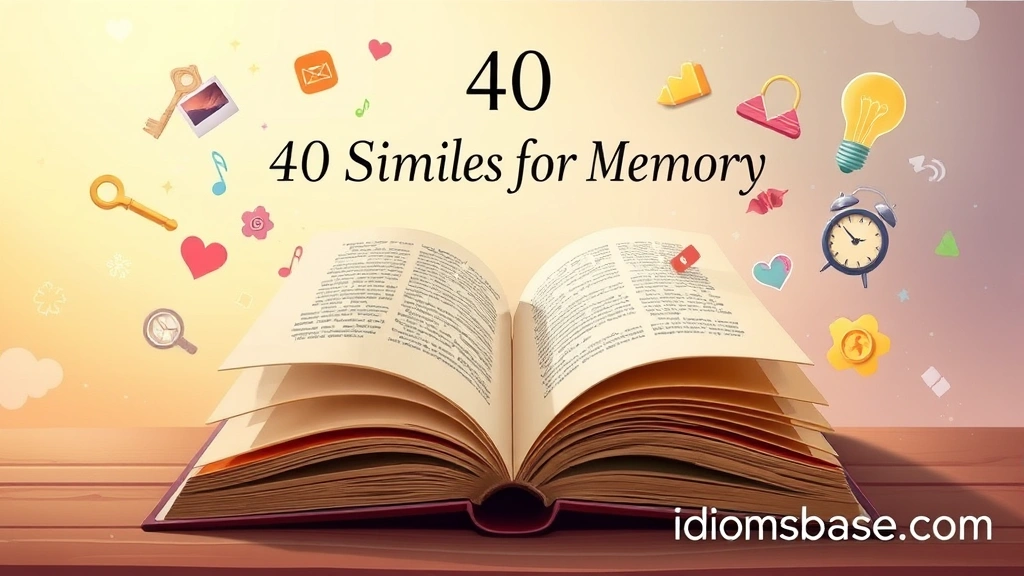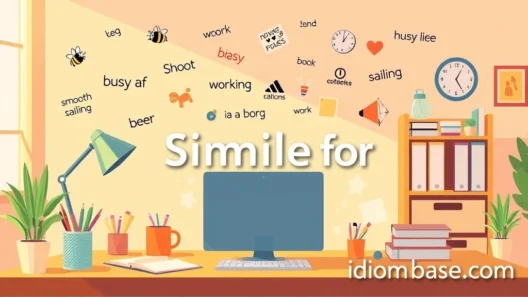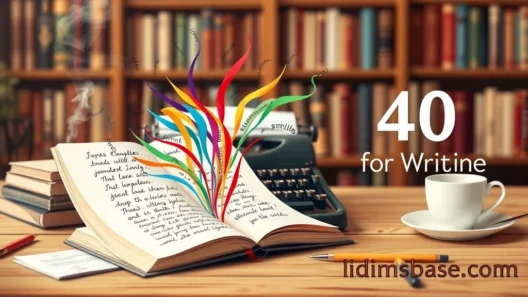Hey there, memory marvel! Have you ever found yourself searching for just the right words to describe that incredible, sometimes elusive, thing we call memory? It’s not always easy, is it? Sometimes it's sharp and clear, like a freshly polished mirror. Other times, it's a bit fuzzy, like an old photograph fading in the sun.
That's why we're diving into the wonderful world of similes for memory! Similes are those fantastic literary tools that help us compare two unlike things using "like" or "as." They paint vivid pictures in our minds and make our descriptions much more engaging. Whether you're a writer, a student, or just someone who loves playing with words, you'll find this list super helpful. Get ready to unlock 40 creative ways to talk about memory, from the fleeting to the unforgettable!
Unlocking the Vault: 40 Similes for Memory
Memory is a fascinating thing, isn't it? It's personal, powerful, and incredibly complex. Let's explore some captivating ways to describe it!
Memory as a Physical Object
Imagine memory as something you can almost touch or hold. These similes give it a tangible quality.
- Like a well-worn path: Just as a path becomes clearer with repeated use, early memories can be the most vivid and easily recalled.
- Like a dusty attic: Sometimes, memories are stored away, forgotten until something triggers their recall, much like finding treasures in an old attic.
- Like a fragile glass ornament: Some memories are delicate and easily shattered or distorted, especially those from traumatic events.
- Like a deep well: Memory can be vast and profound, with some recollections buried deep, requiring effort to retrieve.
- Like a tangled ball of yarn: Memories can be interconnected and messy, making it hard to untangle one from another.
- Like a filing cabinet: Our brains organize memories, sometimes neatly, sometimes haphazardly, just like a cabinet filled with documents.
- Like a leaky sieve: New information can slip away quickly if not properly retained, much like water through a sieve.
- Like a scratched record: Some memories might skip or repeat, stuck in a loop, or have missing pieces.
- Like a crumbling ruin: Old memories can decay over time, losing details and becoming less distinct.
- Like a precious jewel: Certain memories are cherished and held onto tightly, sparkling with significance.
Memory as a Natural Phenomenon
Nature offers powerful metaphors for memory, reflecting its organic and sometimes unpredictable nature.
- Like a flowing river: Memory is constantly moving, carrying new experiences and adapting, never quite the same from moment to moment.
- Like a gentle breeze: Some memories are light and fleeting, passing through our minds almost unnoticed.
- Like a morning mist: Memories can be hazy and unclear, especially when trying to recall details from long ago.
- Like a roaring fire: Intense emotions can make memories burn brightly, unforgettable and vivid.
- Like a shifting sand dune: Memories can change or be reshaped over time, influenced by new experiences or perspectives.
- Like a vast ocean: The depth and breadth of memory can be overwhelming, filled with countless experiences.
- Like a blossoming flower: Some memories unfold beautifully over time, revealing new layers of understanding.
- Like a persistent echo: Certain memories, especially those tied to strong emotions, can linger and repeat in our minds.
- Like a winter storm: Traumatic memories can be harsh and overwhelming, leaving a lasting impact.
- Like sunlight on water: Memories can shimmer and dance, appearing clear one moment and distorted the next.

Memory as a Living Entity or Action
These similes bring memory to life, describing its active and sometimes independent qualities.
- Like a mischievous child: Memory can be playful and unpredictable, sometimes hiding details or bringing up unexpected things.
- Like a loyal dog: Some memories stick by us, always there when we need them, offering comfort or guidance.
- Like a fading photograph: Over time, the sharpness and vibrancy of memories can diminish, much like an old photo.
- Like a dream: Memories can be surreal and illogical, blending reality with imagination.
- Like a spider's web: Memories are intricate and interconnected, with one thought leading to many others.
- Like a ghost: Some memories haunt us, appearing unexpectedly and carrying emotional weight.
- Like a hungry beast: Memory can consume our thoughts, especially when we dwell on certain events.
- Like a delicate dance: Recalling memories can be a graceful and intricate process, requiring coordination of thoughts.
- Like a hidden treasure map: Memory can guide us to important insights or past experiences, revealing hidden wisdom.
- Like a runaway train: Sometimes, memories can rush through our minds, overwhelming us with their speed and intensity.
Memory as a Tool or Medium
Consider memory as something we use, or a medium through which we experience the past.
- Like a blank canvas: At birth, our memory is empty, waiting to be filled with experiences and knowledge.
- Like a sharp knife: Memory can be precise and cut through confusion to reveal the truth.
- Like a mirror: Memory reflects past events, sometimes clearly, sometimes distortedly.
- Like a record player: Memory can replay past moments, allowing us to relive experiences.
- Like a library: Our memory stores vast amounts of information, categorized and ready for retrieval.
- Like a digital hard drive: Memory can store immense amounts of data, though retrieval speed can vary.
- Like a well-oiled machine: A healthy memory functions smoothly and efficiently.
- Like a finely tuned instrument: Memory can recall details with precision and nuance, especially when well-practiced.
- Like a delicate lock: Some memories are protected, requiring a specific key or trigger to unlock them.
- Like a worn-out book: Memories can become tattered and fragmented over time, losing their original crispness.
Frequently Asked Questions About Memory and Similes
You've got questions, we've got answers! Let's dive deeper into the world of memory and how we describe it.

Q1: Why are similes important for describing memory?
Similes are incredibly important because they help us understand abstract concepts like memory by comparing them to something concrete and relatable. They create vivid imagery, making our descriptions more memorable and engaging. Think about it: saying "memory is like a dusty attic" instantly paints a picture of old, forgotten things waiting to be discovered, which is much more impactful than just saying "memory can be hard to access."
Q2: How can I improve my memory?
Improving your memory is a fantastic goal! Here are a few proven strategies:
- Stay active: Regular exercise boosts blood flow to the brain, which is great for memory.
- Eat a brain-healthy diet: Foods rich in omega-3 fatty acids, antioxidants, and vitamins are your brain's best friends. Think berries, leafy greens, and fish!
- Get enough sleep: Sleep is crucial for memory consolidation, the process where your brain turns short-term memories into long-term ones.
- Learn new things: Challenging your brain with new skills, languages, or hobbies helps build new neural pathways.
- Stay social: Social interaction can reduce stress and depression, which are often linked to memory issues.
- Practice mindfulness: Meditation and mindfulness can improve focus and attention, both vital for memory.
Q3: What's the difference between a simile and a metaphor?
Ah, a classic question!
- Simile: Compares two unlike things using "like" or "as." Example: "Her memory was like a sponge, soaking up every detail."
- Metaphor: Directly states that one thing is another, without using "like" or "as." Example: "Her memory was a sponge, soaking up every detail."
The key difference is the explicit comparison with "like" or "as" in a simile. Both are powerful literary devices, but similes tend to be a bit more straightforward in their comparison.
Q4: Can strong emotions affect how we remember things?

Absolutely! Strong emotions, whether positive or negative, can significantly impact memory. Highly emotional events often create vivid, long-lasting memories, sometimes called "flashbulb memories" (like remembering exactly where you were during a major historical event). However, intense stress or trauma can sometimes lead to fragmented or suppressed memories, or even distort them. Our emotional state at the time of an event, and when recalling it, plays a huge role in how those memories are formed and retrieved.
Q5: How can I use these similes in my writing or conversations?
These similes are perfect for adding flair and depth to your communication!
- In writing: Use them to make your characters' thoughts on memory more vivid, to describe a plot point involving memory recall, or simply to add poetic language to your descriptions.
- In conversations: When someone says, "I can't remember a thing!" you could playfully respond, "Is your memory like a leaky sieve today, too?" It adds humor and a touch of creativity.
- For self-reflection: Thinking about your own memory in terms of these similes can help you understand its patterns and quirks. Is your memory a "filing cabinet" that needs organizing, or a "deep well" you need to draw from?
Q6: Are there different types of memory?
Yes, memory isn't just one thing! It's a complex system with several types:
- Sensory Memory: Very brief, holds sensory information (like the afterimage of a flash of light).
- Short-Term Memory (Working Memory): Holds a small amount of information for a short period (like a phone number you just looked up).
- Long-Term Memory: Stores information for extended periods, and is further divided into:
- Explicit (Declarative) Memory: Conscious recall of facts and events.
- Episodic Memory: Personal experiences (your first day of school).
- Semantic Memory: Facts and general knowledge (the capital of France).
- Implicit (Non-Declarative) Memory: Unconscious memory, influencing behavior without conscious recall.
- Procedural Memory: Skills and habits (how to ride a bike).
- Priming: Exposure to one stimulus influences response to another.
- Classical Conditioning: Learned associations (salivating at the sound of a bell).
- Explicit (Declarative) Memory: Conscious recall of facts and events.
Each type of memory has its own characteristics, which is why describing memory can be so varied!
Key Takeaways: Mastering Memory Similes
You've journeyed through a rich landscape of similes for memory, and now you're armed with a fantastic vocabulary to describe this intricate human ability.
- Memory is diverse: From a "dusty attic" to a "flowing river," memory takes on many forms, reflecting its complexity and varied nature.
- Similes enhance understanding: They make abstract concepts concrete, helping your audience visualize and connect with your descriptions.
- Practice makes perfect: The more you use these similes in your writing and speaking, the more naturally they'll come to you.
- Memory is a powerful tool: Understanding how we describe memory can even help us understand memory itself better.
- Creativity is key: Don't be afraid to invent your own similes! The best ones often come from personal insights and unique observations.
So, go forth and describe memory with newfound flair! Whether you're writing a story, giving a presentation, or simply reflecting on your own experiences, these similes will help you articulate the incredible, ever-changing nature of memory. Which simile resonated most with you? What new simile can you come up with? Share your thoughts and keep those creative juices flowing!






